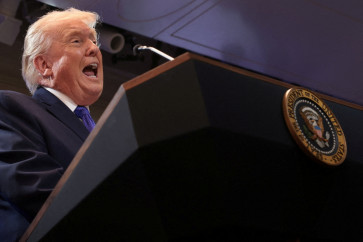Popular Reads
Top Results
Can't find what you're looking for?
View all search resultsPopular Reads
Top Results
Can't find what you're looking for?
View all search resultsDual currency operates in border areas
Crossing the line: People walk through a border post between Entikong, West Kalimantan, and Tebedu, Serawak in Malaysia, on Feb
Change text size
Gift Premium Articles
to Anyone
C
span class="caption" style="width: 398px;">Crossing the line: People walk through a border post between Entikong, West Kalimantan, and Tebedu, Serawak in Malaysia, on Feb. 5. JP/Severianus EndiIt was still only 4:10 a.m. on a Sunday in early February but a long line of buses and cars had already formed at Jl. Malindo near the Entikong border crossing in Sanggau regency, which separates Indonesia’s West Kalimantan from Sarawak, East Malaysia.
“It’s busy at this time. They are lining up to enter Sarawak because the gate doesn’t open till 5 a.m.,” said a man having coffee in a nearby eatery.
The eatery is owned by Adi, 37, of Sambas regency, West Kalimantan. He has been running it for the past two years and transactions are carried out in both countries’ currencies — the Indonesian rupiah (Rp) and Malaysian ringgit (RM).
Adi’s eatery is located a stone’s throw from the border. The area is called Pasar Baru, or Bandar Mutiara by Malaysian visitors. There is a passport checkpoint for residents who wish to cross over to Malaysia.
Adi said that in general he carried out transactions in both rupiah and ringgit. In a day, he said transactions could reach up to RM 200, or around Rp 600,000, with an exchange rate of RM 1 to about Rp 3,000.
His customers are mostly Malaysian tourists who have traveled to West Kalimantan. If they pay in rupiah, it indicates they have stayed in West Kalimantan for a day or two and still have a little rupiah left over.
Usually, Malaysian citizens traveling to West Kalimantan change large amounts of ringgit into rupiah at the money changer located a few doors down from Adi’s eatery. However, Adi can also manage a small amount of currency exchange.
A waitress at the Bintang Kiki Hotel in Sontas hamlet, around 4 km before the Entikong border, said that those who do not travel by car or bus could take a public minivan to Sarawak.
“Indonesians prefer to shop for groceries in Serian, which is larger than Tebedu,” she said.
Tebedu is a bustling transit town where business can still be conducted in rupiah as it is relatively near the border. Tebedu is often visited by visitors from West Kalimantan to shop or just have lunch.
The distance between Tebedu and the Entikong border is only 4 km and costs RM 2 by public van.
“But the border gate closes at 5 p.m. If you are late, you have to stay for the night and wait for the gate to re-open at 5 a.m.,” said the waitress, who preferred not to be named.
Tebedu, Serian and Kuching, in Sarawak are favorite destinations visited by West Kalimantan residents. Tebedu is only 15 minutes’ drive along a well-maintained road lined by forest and meadows.
The fare to Serian, which is 30 minutes away, is RM 7, while the fare from Entikong to Kuching, a distance of around 90 kilometers, is RM 15 by public minivan.
A bus journey from Pontianak to Entikong takes up to seven hours. Buses generally leave Pontianak at 9 p.m. and arrive at the border gate before 5 a.m.
The bus fare from Pontianak to Kuching costs Rp 165,000 (about US$18), but it costs the same to stop in Entikong, where many cars with Malaysian license plates can be noticed.
Those who wish to travel to Sarawak in their own cars must pay road tax at the local transportation office and apply for a permit from Jawatan Pengawas Jalanraya (JPJ), the Malaysian transportation office.
A car permit is valid for a month. There are two stickers attached to the car, one from the local transportation office and the other from JPJ. Motorists must pay Rp 90,000 to the local transportation office and RM 70 to JPJ for the car permit.
Malaysian police officers usually conduct traffic surveillance on suspicious cars traveling from West Kalimantan to Sarawak. They often inspect cars to check the identities of passengers.
Residing in areas close to the border means carrying a passport is commonplace. Areifhany Ransha, 21, a university student in Pontianak who hails from Pengadang village, Sekayam district, Sanggau regency, said it was usual for a border resident to own a passport.
“Everyone in our family, except our youngest sibling, has a passport. At times we visit our uncle who is married to a Malaysian and lives in Kuching,” said Areifhany.
A resident of Sontas hamlet, Juwin, 50, said he had worked in Malaysia when he was young. He recalled that working there was very pleasant because everything was well organized and he received his salary once a fortnight.
“But for me, it’s still nice to be an Indonesian. It’s more peaceful living in our own home village,” said Juwin, who owns a rubber farm now.
“It’s easy to find a job in Sarawak, if you want to. They are in dire need of workers due to limited manpower there,” said Juwin, who is from the Dayak Bidayuh tribe which is related to a similar tribe in Sarawak.










